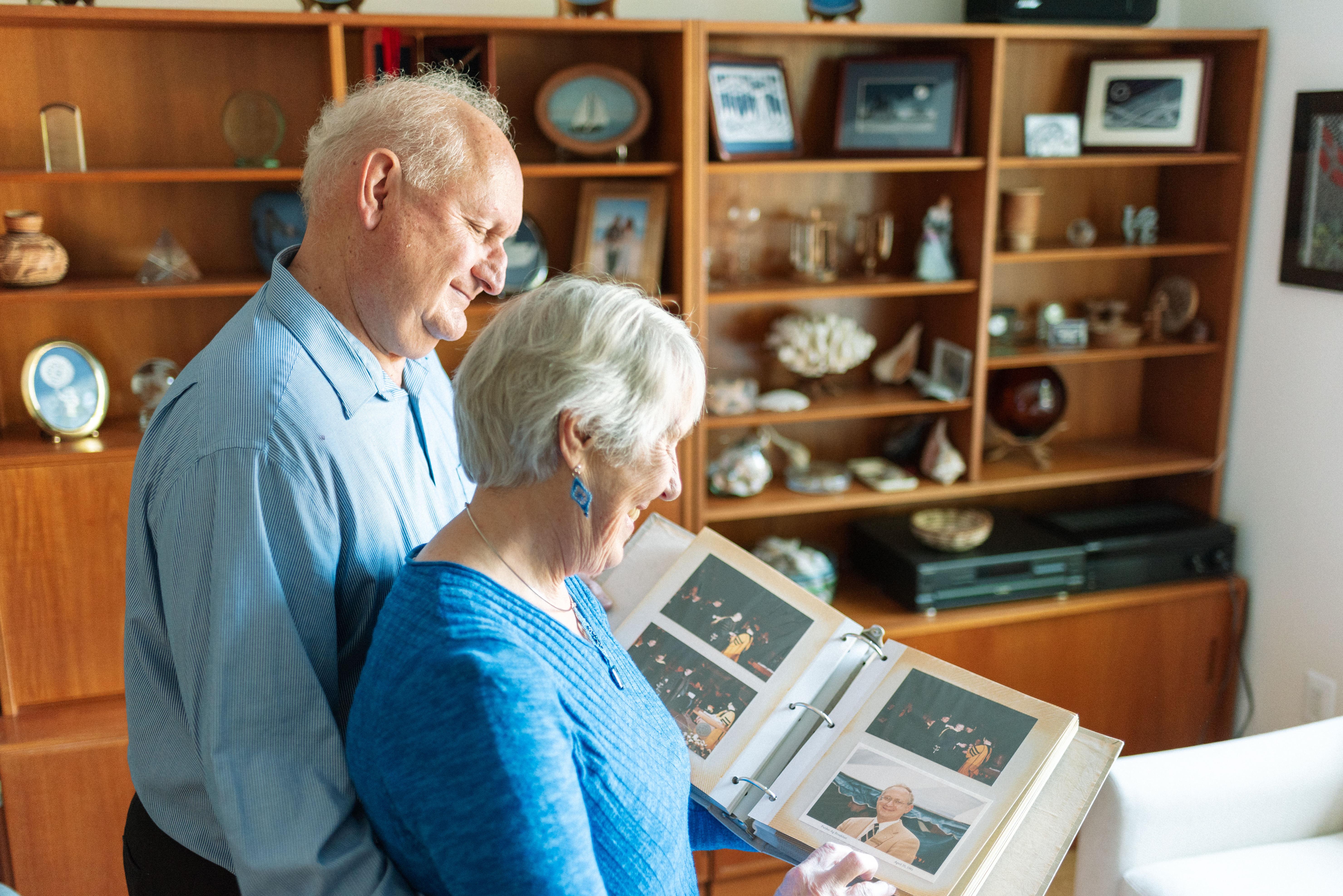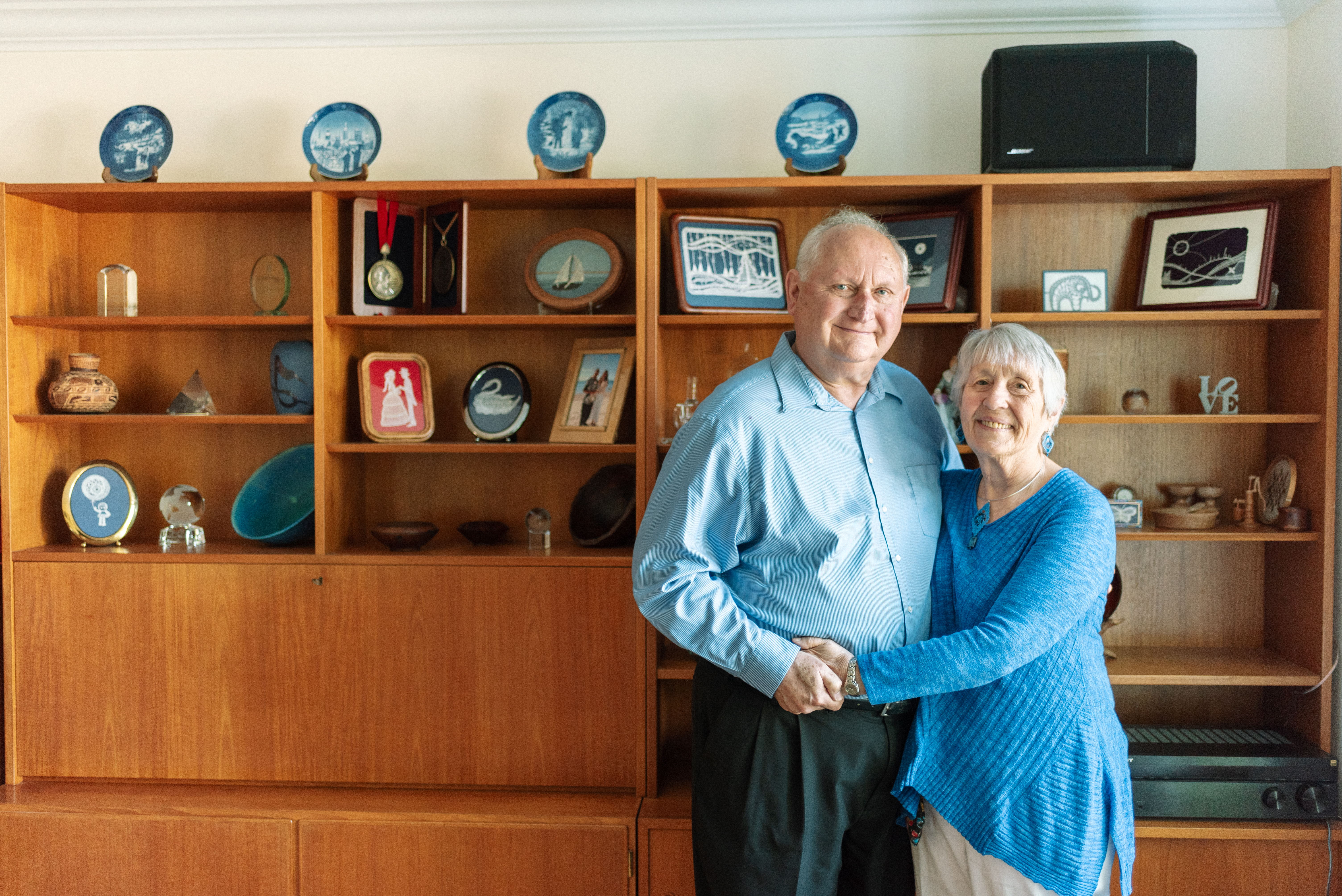Funding endowed chair in agricultural economics reflects couple’s global vision brought home: “Purdue is special in our lives”
Bob and Karen Thompson have operated as a team, both throughout their 55-year marriage and in their long-standing commitment to sending Purdue Agriculture students abroad and welcoming international students to their home.
Now the Thompsons are strengthening the international focus of Bob’s former department by endowing the Robert and Karen Thompson Chair in International Agricultural Economics. The couple hopes the position will ensure a leading scholar in an international aspect of the discipline such as trade, development or comparative agricultural policy “to help solidify the commitment to the international focus in the offerings of the department,” he says.
The Thompson Chair is open-ended by design. “As a former dean, I understand that the college has to have the flexibility to respond to greatest needs and opportunities that come along that you never see coming,” Bob says.
Thompson knows about unanticipated opportunities. He grew up in New York state, so close to the Canadian border that the news source in his home was the Canadian Broadcasting Company, which he credits with “more of an international perspective than the average American community would get.”
Despite his emerging interest in international affairs, his options for study abroad were limited. Some local high schools sent students overseas through American Field Service (AFS) programs. “I really wished my little rural high school — I was in a graduating class of 20 — would get an AFS program, but it never did,” he recalls.
Thompson’s focus on agricultural policy emerged as an undergraduate at Cornell University, where he became intrigued by international food issues such as hunger and poverty. He applied for the university’s two study abroad scholarships — and ended up as first runner-up for each of them. Based on his interest, however, officials told him that if he was accepted to another program, Cornell would support him with additional scholarship funds.
Thompson wasn’t selective about his destination. “My first choice was ‘wherever,’” he says.
“Wherever” turned out to be Denmark for his junior year, where he met Karen, then a student in elementary education who grew up on a small farm on the Danish island of Bornholm. The couple maintained a long-distance romance for two years after Bob returned to Cornell and then completed a master’s degree at Purdue.

Shortly after they married in August 1968, the Thompsons went to Laos with International Voluntary Service, a Peace Corps-type program that allowed the two citizens of different countries to serve together, working with local agriculture and home economics extension agents.
Karen immigrated to the U.S. when they returned from Laos in 1970. That summer, they came to Purdue for her to complete her elementary education degree and Bob to begin a PhD program in agricultural economics. After earning her teaching degree in 1971, Karen started a master’s degree in special education.
In summer 1972, the Thompsons went abroad again, this time to Brazil, where Purdue had an institutional strengthening program with the Federal University of Viçosa dating to the 1950s. Bob collected data for his thesis and taught agricultural production economics in Portuguese, while Karen taught the elementary school-age children of Purdue professors on the Viçosa project.
Now a family of three — their daughter, Kristina, was born in Brazil — the Thompsons returned to Purdue in January 1974. At the May commencement, Karen received her master’s degree, and Bob received his PhD and joined the agricultural economics faculty. Their second child, Eric, arrived a year later. As a faculty member, Bob developed a nationally recognized program in international trade and agricultural development.
In 1983, the family moved to Washington, D.C. for a one-year leave that extended to four. There Bob served as a senior staff economist for the President’s Council on Economic Advisers, and later, assistant secretary for economics for the U.S. Department of Agriculture.
Thompson returned to Purdue as dean of the College of Agriculture in 1987 and was a strong advocate for study abroad. At the beginning of his tenure, only one student in the College of Agriculture was studying overseas. When he left six-and-a-half years later, 10 percent of agriculture students graduated having had an international experience.
Thompson equates his one year in Denmark, two in Laos and two in Brazil, all within a nine-year time frame, to “a second PhD program.”
Having on-the-ground international experience made me much more effective as a professional doing research in other countries. Agriculture is such a global industry. To be a well-prepared professional in any agricultural occupation requires having a global vision or perspective.”
- Bob Thompson
In 1993 Thompson left the dean’s position to return to his passion for developing agriculture and reducing hunger in low-income countries. He became president and chief executive officer of the Winrock International Institute for Agricultural Development; and later moved back to Washington, D.C. to become director of rural development for the World Bank.
In Washington, Karen became volunteer curator of the Smithsonian Institution’s lace collection in its American History Museum. Her mother had taught her the basics of bobbin lace, and over time she honed her skills through training courses in several European countries. In addition to research and writing on lace made in colonial Ipswich, Massachusetts, the only U.S. site of a commercial bobbin lace industry, Karen continues to teach online courses on the technique.
Thompson’s commitment to study abroad laid the groundwork for the nearly 40 percent of Agriculture students who now graduate having studied abroad in hundreds of wide-ranging programs the college offers through International Programs in Agriculture (IPIA).
The Thompsons were so passionate about providing international opportunities to undergraduates that they endowed the Robert L. and Karen H. Thompson Scholarship to support students who participate in international study programs in agriculture.
IPIA asks the scholarship recipients to send the couple a postcard from their overseas institution. “Those are so nice to receive,” Bob says. “The comment that you hear most often is that it’s ‘a life-changing experience.’ It certainly was for me.”
Ensuring that agriculture students experience different cultures firsthand is good for Indiana agriculture, Karen adds. “It’s great for the ones who go back on the farms, but for the ones who are hired by agribusiness, the firms want international experience.”
Bob credits Karen for managing family and hosting responsibilities while he taught, conducted research and served in administrative positions. In addition to raising bicultural and bilingual children, the Thompsons regularly welcomed international students and friends to their home. Karen recalls learning to prepare an American Thanksgiving dinner before she had ever had one herself.
“Our children grew up with the American part of the family, the Danish part of the family, but also the international students at Purdue, because they really became our third family, to us and our children,” she says. “And it’s so important for the international students to get to know an American home and family.”
Not surprisingly, the travel bug also bit the Thompsons’ children. Kristina studied in Denmark in high school and college before volunteering with the Peace Corps in Benin and later, in Rwanda with her husband, Tom. The couple currently is assigned to Cotonou, Benin, where she is the Peace Corps’ country program and training director, and Tom teaches in the international school.
Both Eric and his wife, Amy, are Purdue graduates. Eric spent his junior year in Purdue Engineering at a German university and completed graduate study at the Danish Technical University. He now works in human hearing research for the Air Force. Their son is a high school senior, and their two daughters both studied abroad as college students.
“You detect a pattern here?” Bob asks, smiling.
The international perspective that the Thompsons cultivated in their own home has over time changed the College of Agriculture, by broadening student horizons through study abroad, and now, in a new chair in agricultural economics that promises to impact teaching and research.







